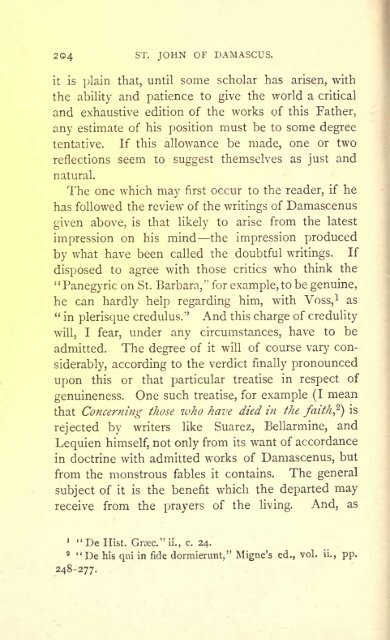st. john of damascus (676-749 - Cristo Raul
st. john of damascus (676-749 - Cristo Raul
st. john of damascus (676-749 - Cristo Raul
Create successful ePaper yourself
Turn your PDF publications into a flip-book with our unique Google optimized e-Paper software.
204 ST -<br />
JOHN OF DAMASCUS.<br />
it is plain that, until some scholar has arisen, with<br />
the ability and patience to give the world a critical<br />
and exhau<strong>st</strong>ive edition <strong>of</strong> the works <strong>of</strong> this Father,<br />
any e<strong>st</strong>imate <strong>of</strong> his position mu<strong>st</strong> be to some degree<br />
tentative. If this allowance be made, one or two<br />
reflections seem to sugge<strong>st</strong> themselves as ju<strong>st</strong> and<br />
natural.<br />
The one which may fir<strong>st</strong> occur to the reader, if he<br />
has followed the review <strong>of</strong> the writings <strong>of</strong> Damascenus<br />
given above, is that likely<br />
to arise from the late<strong>st</strong><br />
impression on his mind the impression produced<br />
by what have been called the doubtful writings. If<br />
disposed to agree with those critics who think the<br />
"<br />
on "Panegyric St. Barbara," for exam pie, to be genuine,<br />
he can hardly help regarding him, with Voss, 1 as<br />
in plerisque credulus. ;<br />
And this charge <strong>of</strong> credulity<br />
will, I fear, under any circum<strong>st</strong>ances, have to be<br />
admitted. The degree <strong>of</strong> it will <strong>of</strong> course vary con<br />
siderably, according to the verdict finally pronounced<br />
upon this or that particular treatise in respect <strong>of</strong><br />
genuineness. One such treatise, for example (I mean<br />
that Concerning those who have died in the faith?) is<br />
rejected by writers like Suarez, Bellarmine, and<br />
Lequien himself, not only from its want <strong>of</strong> accordance<br />
in doctrine with admitted works <strong>of</strong> Damascenus, but<br />
from the mon<strong>st</strong>rous fables it contains. The general<br />
subject <strong>of</strong> it is the benefit which the departed may<br />
receive from the prayers <strong>of</strong> the living. And, as<br />
1<br />
2<br />
"De Hi<strong>st</strong>. Groec." ii., c. 24.<br />
"De his qui in fide dormierunt," Migne s ed., vol. ii., pp.<br />
248-277.
















